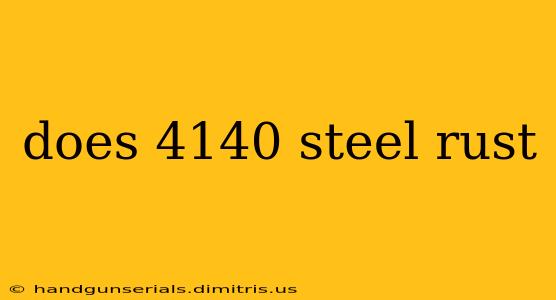4140 steel, a popular alloy steel known for its strength and toughness, is often used in demanding applications. But a crucial question many engineers and fabricators ask is: does 4140 steel rust? The short answer is yes, 4140 steel can rust, but its susceptibility depends on several factors. This article will delve into the intricacies of 4140 steel corrosion and how to mitigate it.
Understanding Rust and Corrosion
Before we dive into the specifics of 4140 steel, let's clarify the terms "rust" and "corrosion." Rust is a specific form of corrosion that affects iron and its alloys, like steel. It's the reddish-brown coating that forms when iron reacts with oxygen in the presence of water or moisture. Corrosion, on the other hand, is a broader term encompassing the deterioration of a material due to its reaction with its environment. This can include rust but also other forms of degradation.
4140 Steel Composition and its Impact on Rusting
4140 steel is a medium-carbon alloy steel containing chromium, molybdenum, and manganese. These alloying elements enhance its strength, toughness, and hardenability. However, they don't inherently prevent rust. While the chromium content offers some degree of corrosion resistance, it's not sufficient to make 4140 steel completely immune to rust. The iron content, which is significant, remains the primary element susceptible to oxidation and the formation of rust.
Factors Affecting Rust Formation in 4140 Steel
Several factors influence how quickly and severely 4140 steel will rust:
- Exposure to Moisture: The presence of water or moisture is crucial for rust formation. Prolonged exposure to rain, humidity, or saltwater significantly accelerates the rusting process.
- Oxygen Levels: Oxygen acts as an oxidant, reacting with the iron in the steel to form iron oxide (rust). Higher oxygen levels lead to faster rust formation.
- Environmental Contaminants: Exposure to acidic or alkaline substances can increase the rate of corrosion. Industrial environments or areas with high levels of pollution can accelerate rusting.
- Surface Finish: A rough surface provides more area for oxygen and water to react with the steel, increasing the risk of rust. Smooth, polished surfaces offer better resistance to corrosion.
- Heat Treatment: The heat treatment process can influence the microstructure of the steel, impacting its susceptibility to corrosion. Improper heat treatment can lead to increased vulnerability to rust.
Protecting 4140 Steel from Rust
There are several methods to protect 4140 steel from rust:
- Protective Coatings: Applying coatings like paint, powder coatings, galvanizing (zinc coating), or plating (e.g., nickel, chrome) creates a barrier between the steel and the environment, preventing corrosion.
- Regular Cleaning and Maintenance: Regularly cleaning the steel and removing any rust or contaminants helps prevent further corrosion.
- Controlled Environments: Storing 4140 steel in dry, well-ventilated areas minimizes moisture exposure and reduces the risk of rust.
- Corrosion Inhibitors: Applying corrosion inhibitors creates a chemical barrier that slows down the oxidation process.
Conclusion: Managing Rust in 4140 Steel Applications
While 4140 steel is not inherently rust-proof, understanding the factors that contribute to corrosion and employing appropriate protective measures can significantly extend its lifespan and maintain its structural integrity. Proper selection of coatings, environmental controls, and regular maintenance are crucial for managing rust in applications utilizing 4140 steel. Remember that proactive measures are key to preventing extensive damage and ensuring the long-term performance of components made from this versatile alloy.

